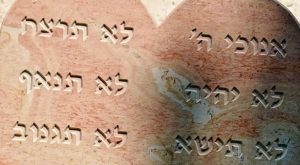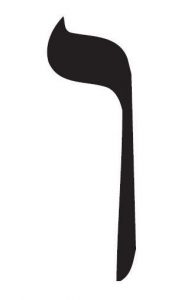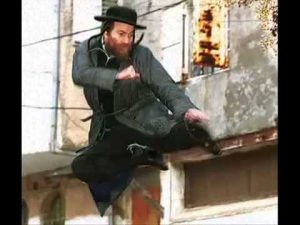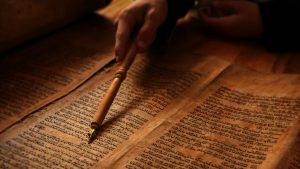Mishpotim 2019: Torah Knowledge vs. Ethical Behavior
by devadmin | January 31, 2019 7:19 pm
Raboyseyee & Ladies,
Torah Knowledge vs. Ethical Behavior
Is it more important to be learned in Toirah which avada includes the heylige Gemora, laws & customs, and much more, or, is it perhaps just as important -maybe more so- to be a mentch (a good person), even at the expense of knowledge? Can one be one without the other? Shoin, so many questions, ober where can we find answers? Maybe in this week’s parsha? And why does the Oisvorfer lead with this question? Let’s find out!
 Following the metaphorical chasuna (wedding) which was described in last week’s parsha, during which the Yiddin received the Aseres Hadibrois (The Ten Commandments), this week’s parsha of Mishpotim contains another 53 laws. The details of the wedding are emerging. Most of the new laws are of the thou shall not-do variety. The RBSO picked us, the Yiddin, to be His Chosen People and we the people, must adhere to His rules. He is the boss. Going forward, and until we get to the end of sefer Devorim (Deuteronomy), Moishe will be teaching the Yiddin the balance of the mitzvois which total 613. Somehow, 613 grew by thousands more -exactly how, ver veyst- ober the fact is that our “Rabbi’s” tacked them on for good measure. That topic for another day. Ober speaking of rabbis, this week, the Oisvorfer takes aim -a few paragraphs below- at one who has gone rogue.
Following the metaphorical chasuna (wedding) which was described in last week’s parsha, during which the Yiddin received the Aseres Hadibrois (The Ten Commandments), this week’s parsha of Mishpotim contains another 53 laws. The details of the wedding are emerging. Most of the new laws are of the thou shall not-do variety. The RBSO picked us, the Yiddin, to be His Chosen People and we the people, must adhere to His rules. He is the boss. Going forward, and until we get to the end of sefer Devorim (Deuteronomy), Moishe will be teaching the Yiddin the balance of the mitzvois which total 613. Somehow, 613 grew by thousands more -exactly how, ver veyst- ober the fact is that our “Rabbi’s” tacked them on for good measure. That topic for another day. Ober speaking of rabbis, this week, the Oisvorfer takes aim -a few paragraphs below- at one who has gone rogue.
This week, the Oisvorfer will focus on but one word in the gantze parsha. Which word and how much can be written about one word? The word is “And.” And on that one word, in reality but one letter, the letter ‘vov,’ myriad pages have been written by many an exegete. What does that word “and” mean in our parsha? Let’s find out? Our parsha begins azoy. “And these are the judgments…”
|
א וְאֵ֨לֶּה֙ הַמִּשְׁפָּטִ֔ים אֲשֶׁ֥ר תָּשִׂ֖ים לִפְנֵיהֶֽם: |
 The letter ‘vov’ which begins the word V’eyla, (and) meaning ‘and these are’ indicates that there was something before, ober what is the heylige Toirah referring to? Rashi will tell us that just as the Ten Commandments were given on Mt. Sinai, so too were these and other new laws. Ober, didn’t we learn just two weeks back that the RBSO already had given the Yiddin certain laws while the Yiddin were over at a place called Marah (so named for its bitter waters)? We did. Are those very laws repeated here in our parsha? That depends on whom you ask. Some say that the RBSO did already tell Moishe to instruct the Yiddin in these very ordinances over at Moro, and that they are being repeated here, while others argue that only certain laws were given and that this week’s parsha is more comprehensive and contains new laws as well. In any event, what all agree upon is this: these laws, the ones give in our parsha, all deal with civility; how men (and women) are to get along with one another, to play nice, and specifically what to do (using Moishe’s court system) when one violates the laws of inter-personal relationships. And just why will the Oisvorfer be delving into this topic this week? Nu, let’s begin azoy.
The letter ‘vov’ which begins the word V’eyla, (and) meaning ‘and these are’ indicates that there was something before, ober what is the heylige Toirah referring to? Rashi will tell us that just as the Ten Commandments were given on Mt. Sinai, so too were these and other new laws. Ober, didn’t we learn just two weeks back that the RBSO already had given the Yiddin certain laws while the Yiddin were over at a place called Marah (so named for its bitter waters)? We did. Are those very laws repeated here in our parsha? That depends on whom you ask. Some say that the RBSO did already tell Moishe to instruct the Yiddin in these very ordinances over at Moro, and that they are being repeated here, while others argue that only certain laws were given and that this week’s parsha is more comprehensive and contains new laws as well. In any event, what all agree upon is this: these laws, the ones give in our parsha, all deal with civility; how men (and women) are to get along with one another, to play nice, and specifically what to do (using Moishe’s court system) when one violates the laws of inter-personal relationships. And just why will the Oisvorfer be delving into this topic this week? Nu, let’s begin azoy.
 The Oisvorfer has, over the last few months, been observing a particular Jew, one adorned with a beard. Payis too. He’s not Chasidic, in fact, quite the opposite. One who is ordained and is no doubt well versed in the folios of the heylige Gemora and many other seforim dealing with Jewish laws and customs. He is an ordained rabbi no doubt. Ober, despite his knowledge and despite his outward appearances, his actions indicate that he is severely lacking in ‘derech eretz,’ in mentchlichkeyt. Instead of using his knowledge and background to unify, he seeks instead to destroy. And that is in fact his reputation. He tears people down. He makes disparaging remarks about others, fabricates and then spreads rumors as if they were gospel. He lies with impunity. He is a bull in a china shop who enjoys watching all crumble around him so that he can rebuild using his own vision. He spends hours each day plotting how to break what already exists so that he can rebuild in his own vision. He relishes honor yet dishonors most if not all, who are different than is he. He is quite the loathsome character despite his great base of knowledge. And without getting into specifics, (feel free to email me for his name), his bizarre and irrational behavior has a good number of people angry with him, some even pissed off, the Oisvorfer included. Ober, the RBSO is so great: mamish. So happens that just this week, as the Oisvorfer was thinking how it was at all shayich (possible) for such a despicable person to masquerade around under the guise of rabbi and a few other titles, and yet insult so many while plotting against others, this week’s parsha begins its discussion with the laws governing civility with that word ‘and.’ As mentioned above, many were perplexed by this word and wanted to understand why the parsha begins with it. Let’s review what a few had to say.
The Oisvorfer has, over the last few months, been observing a particular Jew, one adorned with a beard. Payis too. He’s not Chasidic, in fact, quite the opposite. One who is ordained and is no doubt well versed in the folios of the heylige Gemora and many other seforim dealing with Jewish laws and customs. He is an ordained rabbi no doubt. Ober, despite his knowledge and despite his outward appearances, his actions indicate that he is severely lacking in ‘derech eretz,’ in mentchlichkeyt. Instead of using his knowledge and background to unify, he seeks instead to destroy. And that is in fact his reputation. He tears people down. He makes disparaging remarks about others, fabricates and then spreads rumors as if they were gospel. He lies with impunity. He is a bull in a china shop who enjoys watching all crumble around him so that he can rebuild using his own vision. He spends hours each day plotting how to break what already exists so that he can rebuild in his own vision. He relishes honor yet dishonors most if not all, who are different than is he. He is quite the loathsome character despite his great base of knowledge. And without getting into specifics, (feel free to email me for his name), his bizarre and irrational behavior has a good number of people angry with him, some even pissed off, the Oisvorfer included. Ober, the RBSO is so great: mamish. So happens that just this week, as the Oisvorfer was thinking how it was at all shayich (possible) for such a despicable person to masquerade around under the guise of rabbi and a few other titles, and yet insult so many while plotting against others, this week’s parsha begins its discussion with the laws governing civility with that word ‘and.’ As mentioned above, many were perplexed by this word and wanted to understand why the parsha begins with it. Let’s review what a few had to say.
Said Reb Avigdor Miller so gishmak and mamish relevant, azoy: The heylige Toirah dedicates four entire parshas in Sefer Shmois (Exodus) to the building of the Mishkan, the RBSO’s abode here on earth. It’s the structure where the RBSO’s essence rested while the Yiddin sojourned in the Midbar (desert). Yet, and very amazingly, just after the Yiddin received the Aseres Hadibrois (The Ten Commandments) in last week’s parsha, the heylige Toirah, in this week’s parsha of Mishpotim teaches us not about the Mishkan project, but about 53 new laws pertaining to civility. Instead, we read laws that deal with how people are to interact with one another: civility first. In other words: the RBSO was not going to bring His essence down unless people got along. The RBSO wanted us to know that relationships between men -what we refer to as common mentchlichkeyt and derech eretz (decency among men), is a critical component in our lives. And, by the very manner in which man relates to his fellow man, so also does he relate to the RBSO. Let’s not forget that of the Ten Commandments, five deal with matters between man and his fellow man. One who is selfish and impatient with man, cannot be otherwise to the RBSO. And that’s just the beginning.
 In fact, our Sages have taught us that ‘derech eretz kodmah LaToirah,’ meaning that respect and civility come before the performance of the commandments. Is that why the RBSO gave over certain laws of civility at Marah even before the Yiddin arrived to Har Sinai? Would they have been Toirah worthy without prior knowledge of these laws? Perhaps not. Says the heylige Gemora (Buba Kamma 30A), azoy: He who desires to be a chusid (in this case, the word chusid means either saintly or pious and not one who dresses in Chassidic garb) let him fulfill the laws of tractate Nizikin, the tractate dealing with damages (to others). Said the Nimukei Yosef: what Rebbe Yehuda was saying was that a pious and saintly person must pay particular heed to the laws governing relationships between man and his fellow. Ober, let’s see what Rovo had to say. Who is Rovo? He is the fine gentlemen and very well respected Gemora personality who throughout the Gemora is always arguing pshat and halocho with Abaya. (As an aside, except for in eight cases, we always follow Rovo’s teachings). In any event, Rovo said azoy: one who wishes to act saintly and pious, should fulfill the Tractate of Avos which reduced to writing what our good sages considered the guide to life. Tractate Avos is chock full of tidbits about doing the right thing between man and fellow man.
In fact, our Sages have taught us that ‘derech eretz kodmah LaToirah,’ meaning that respect and civility come before the performance of the commandments. Is that why the RBSO gave over certain laws of civility at Marah even before the Yiddin arrived to Har Sinai? Would they have been Toirah worthy without prior knowledge of these laws? Perhaps not. Says the heylige Gemora (Buba Kamma 30A), azoy: He who desires to be a chusid (in this case, the word chusid means either saintly or pious and not one who dresses in Chassidic garb) let him fulfill the laws of tractate Nizikin, the tractate dealing with damages (to others). Said the Nimukei Yosef: what Rebbe Yehuda was saying was that a pious and saintly person must pay particular heed to the laws governing relationships between man and his fellow. Ober, let’s see what Rovo had to say. Who is Rovo? He is the fine gentlemen and very well respected Gemora personality who throughout the Gemora is always arguing pshat and halocho with Abaya. (As an aside, except for in eight cases, we always follow Rovo’s teachings). In any event, Rovo said azoy: one who wishes to act saintly and pious, should fulfill the Tractate of Avos which reduced to writing what our good sages considered the guide to life. Tractate Avos is chock full of tidbits about doing the right thing between man and fellow man.

Says the medrish (Medrish Rabbah which offers numerous explanations of the word ‘and’ and why the heylige Toirah chose this word to open our parsha), azoy: Said Rebbe Elazar: the entire heylige Toirah is dependent upon justice. Therefore the RBSO presented the Yiddin with the civil laws immediately following the giving of the Ten Commandments. OMG! What Rebbe Elazar is saying is this: justice is the pillar of the entire heylige Toirah. Rebbe Elazar continues: for the time shall come when the Yiddin shall disregard the laws of justice, and He, (the RBSO) will exact retribution from them. And He shall teach the world’s inhabitants a lesson. Wait: there’s more. “For He did not overturn the city of Sodom until they disregarded the laws of justice.” Avada we all know of the reprehensible behavior on display by the Sodomites, and though this zicher angered the RBSO, based on this medrish, the RBSO did not decide to destroy it, until their egregious behavior extended to incivility. Says the Yefeh Toar: “while in regard to most sins committed by a community, the RBSO delays retribution in order to afford the people an opportunity to repent, over the sin of injustice, He exacts immediate retribution.” We’re rolling, let’s quote some more. Says the medrish: And Jerusalem too was not exiled until the Yiddin disregard the laws of justice. Zicher you all recall learning that the Jews of that generation (first temple times) were guilty of other major sins, including a few of the cardinal variety, those very severe in nature including idolatry, murder and immorality. The big three! Sins that greatly anger the RBSO. Ober, their fate was only sealed because of their disregard of the laws governing interpersonal relationships.
Another pshat based on a verse in Tihilim (Psalms) tells us just how much the RBSO despises the violation of interpersonal relationships. Said Dovid Hamelech in Tihilim (11:6), azoy: “He will rain down coals upon the wicked;” fire and brimstone and a burning blast is their allotted portion.
| 6. He shall rain upon the wicked charcoal, fire, and brimstone, and a burning blast is their allotted portion. | ו יַמְטֵ֥ר עַל־רְשָׁעִ֗ים פַּ֫חִ֥ים אֵ֣שׁ וְ֖גָפְרִית וְר֥וּחַ זִ֜לְעָפ֗וֹת מְנָ֣ת כּוֹסָֽם: |
 Why are they to be so severely punished? Because they transgress the commandments and the laws of the heylige Toirah governing inter-personal relationships. Notice the word ‘and.’ These laws were given only after the heylige Toirah, therefore their punishment is more severe than that of one who neglects the Commandments. Says the medrish: the punishment for transgressing the laws between man (bein odom li’chaveyroi) is more severe that the transgression of laws between man and the RBSO (bein odom La’mokoim). And the conjunction letter ‘vov’ meaning ‘and’; is here to teach us that there is additional punishment in store for those who violate interpersonal laws. Wickedness towards man by anyone, especially when knowledgeable and well versed in the folios of the writings, is deserving of severe punishment and retribution. Now we can chap why on Yoim Kippur (Day of Atonement), the RBSO forgives -those who ask nicely and agree not be repeat offenders- all sins one committed bein odom LaMokoim (between man and G-d). That day does not however forgive those who plot and who intentionally go about violating ordinances between man and man. One seeking forgiveness must approach the individuals he offended and personally beg their forgiveness. Hiding behind a beard and knowledge of Torah does not get one a pass. In the case at bar, the beard is transparent.
Why are they to be so severely punished? Because they transgress the commandments and the laws of the heylige Toirah governing inter-personal relationships. Notice the word ‘and.’ These laws were given only after the heylige Toirah, therefore their punishment is more severe than that of one who neglects the Commandments. Says the medrish: the punishment for transgressing the laws between man (bein odom li’chaveyroi) is more severe that the transgression of laws between man and the RBSO (bein odom La’mokoim). And the conjunction letter ‘vov’ meaning ‘and’; is here to teach us that there is additional punishment in store for those who violate interpersonal laws. Wickedness towards man by anyone, especially when knowledgeable and well versed in the folios of the writings, is deserving of severe punishment and retribution. Now we can chap why on Yoim Kippur (Day of Atonement), the RBSO forgives -those who ask nicely and agree not be repeat offenders- all sins one committed bein odom LaMokoim (between man and G-d). That day does not however forgive those who plot and who intentionally go about violating ordinances between man and man. One seeking forgiveness must approach the individuals he offended and personally beg their forgiveness. Hiding behind a beard and knowledge of Torah does not get one a pass. In the case at bar, the beard is transparent.
Says the Beur Maharif so gishmak, azoy: laws that govern in interpersonal relationships are the foundation of the word, for if they are disregarded, the world could not exist.
The bottom line: neither beards, nor payis, nor tzitzis sticking out of one’s pants, whether adorned by a lutvak or a real chusid, make one pious or saintly. Absent of decent behavior towards others, their studies, learning and knowledge, are all worthless. They represent but half of the Ten Commandments the RBSO gave us. Unlike a Chinese menu where one is able to order specific items from various columns, all ten commandments must be adhered to. Those who don’t are but half-men and less. Shoin: the Oisvorfer feels much better!
A gittin Shabbis-
The Heylige Oisvorfer Ruv
Yitz Grossman
Source URL: https://oisvorfer.com/mishpotim-2019-torah-knowledge-vs-ethical-behavior/
